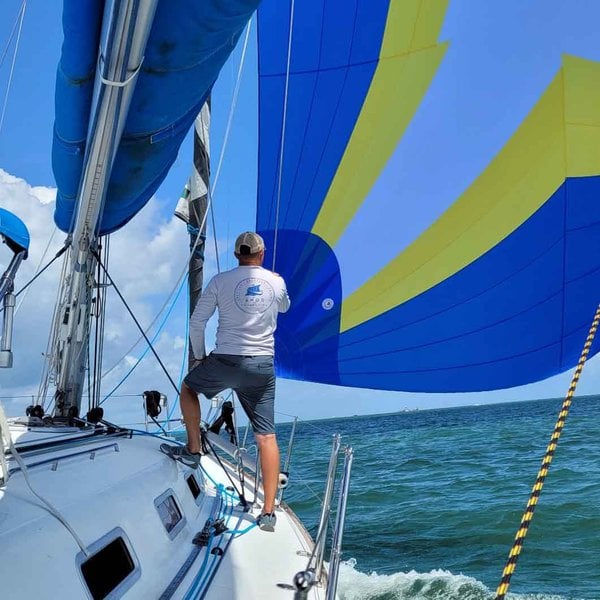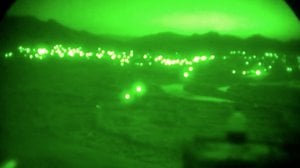
Houthi Missile Strikes Greek Ship, Disrupts Global Trade
Published 10 months ago
This video shows a missile, fired by Yemeni Houthi rebels, striking a Greek-owned cargo ship as it transited the Red Sea on Tuesday, January 16, 2024. The camera is located on the superstructure at the rear of the vessel, providing a view forward. The missile can be seen impacting somewhere forward of cargo hold number four and detonating. Members of the crew can be seen running aft along the port side. The ship is currently at anchor south of Suez, and it is unknown if any of the twenty-four crewmembers were injured.
The Houthis are a predominantly Shia and Zaidi Islamist political and military movement. The group initially opposed President Saleh, whom they accused of corruption and of ties with Saudi Arabia and the United States. When the 2011 Yemeni Revolution failed to produce a viable coalition government, the Houthis joined with Saleh and took control of the capital. The subsequent Saudi intervention to restore an internationally recognized government ignited an ongoing civil war. The Houthis have deep ties with Hezbollah, and Iran, are funded and supported by the Iranian Revolutionary Guard, and are widely considered to be an Iranian proxy. Following the outbreak of the Israel-Hamas war in October 2023, the Houthis began firing missiles (supplied by Iran) at targets in Israel, and at ship’s off Yemen’s Red Sea coast, which they claim is an act of solidarity with Palestinian in the Gaza Strip. The claimed goal is a cessation of combat operations in Gaza and increased access humanitarian aid into the Gaza strip.
The attack on this Greek-owned vessel is part of an effort to grab world attention by disrupting global trade, MV Zografia is typical of the vessels which transit one of this vital shipping lane. Nearly 190 meters in length and thirty-two meters wide, the Zografia boasts five holds, each of which can carry ten to twelve thousand tons of bulk cargo. Typical cargos carried by this type of vessel include grain, steel products, cement, coal, petroleum coke, and the like. Other ships, container ships such as oil or chemical tankers, or roll-on/roll-off vessels, also transit the Suez Canal and the Red Sea carrying goods between Europe and Asia, accounting for 9 million barrels of oil per day, one third of the world’s container traffic, and twelve percent of global trade goods.
Though MV Zografia was in ballast (travelling empty), and no cargo was damaged or lost, attacks such as these force shipping companies to alter their routes, thus affecting global trade and the cost of goods and commodities worldwide. The increased risks compel insurance companies to raise rates for ships transiting the Red Sea, and many ship management companies chose not to risk vessels and crews by rerouting around Africa. For example, the passage from Singapore to Antwerp, Belgium, via the Red Sea and the Suez Canal is approximately 15,000 km, while rounding the Cape of Good Hope extends the voyage to almost 22,000 km, as significantly longer and more expensive voyage. This cost is passed along to consumers because their cement, grain, and Play Stations cost significantly more to ship, contributing to the already troublesome issue of inflation. The Houthis claim that they are targeting vessels specifically linked to the U.S. or Israel, but the convoluted nature of international shipping means that a ship might be built in China, owned by a company in Singapore, managed by a company from the UK, crewed by sailors from Ukraine, India, and the Philippines, and hired by a company in Mexico to ship a cargo to a customer in Italy. These attacks are intended to hold the world hostage by disrupting global trade, and action which serves Iran’s foreign policy agenda.
Messing about with global shipping and maritime trade is a wonderful way to gain the attention of maritime powers and commercial powers, and to draw them into conflict, and the United States is both. Though most students in American schools are taught that taxation without representation caused Americans to rebel against Great Britain, the fact is that British enforcement of the Navigation Acts was equally as responsible for colonial ire, as it disrupted American trade with European colonies in the Caribbean and turned many colonial merchants into smugglers. America’s first foreign war, the Quasi War with France, was partially caused by French interference with American trade, as was the Barbary War and the War of 1812 (partly). Attacks on neutral shipping by Imperial German U-boats during World War I and Nazi U-boats in World War II both served to draw the United States into those conflicts. Interfering with global trade has and will continue to generate responses from the U.S. and its allies, as it should, but there are bound to be unforeseen consequences. Still, world can not be held hostage by Iran and its proxies and therefore must respond, though it will undoubtedly increase existing tensions and lead to greater conflict in the region. And so it goes.
About the Author

Cam
Cam served as an infantry officer in the Marine Corps, deploying to the Horn of Africa and participating in combat operations in Iraq. He currently works in the maritime industry and in the defense sector as an instructor of combined arms planning and operations. An avid sailor, Cam founded and directs Triumph Sailing, a nonprofit that supports veterans and first responders through adventure and fellowship on the water. Triumph Sailing just completed its big yearly event, an offshore race in the Gulf of Mexico with an all veteran crew. You can support the mission and next year's sailing season at Tri-Sail.Org.













